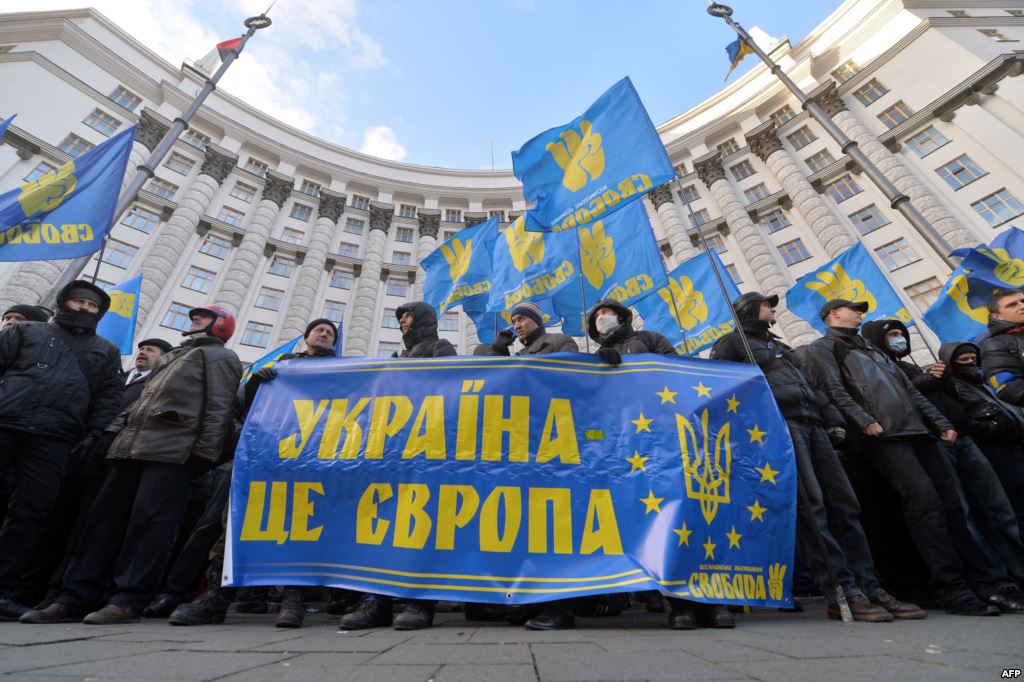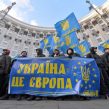
Ukraine—Strong People, Weak State (Part Two): Impact on Foreign Relations
Publication: Eurasia Daily Monitor Volume: 10 Issue: 218
By:

Ukraine’s refusal to sign an Association Agreement with the European Union at the November 28–29 summit in Vilnius has resulted in a sharp cooling of relations between President Viktor Yanukovych and the West. Kyiv is hosting the Organization for Security and Cooperation in Europe (OSCE) ministerial on December 5–6. But several high-profile visits and meetings with officials from Brussels and EU member states have already been canceled. Meanwhile, German Foreign Minister Guido Westerwelle arrived in the Ukrainian capital on December 4 to visit the demonstrations as well as meet with Ukrainian opposition party leaders (Interfax Ukraine, December 4).
The United States’ top diplomat, Secretary of State John Kerry, has also symbolically canceled his visit to Kyiv in favor of a visit to Moldova—an Eastern Partnership member that initialed an association and free-trade agreement with the EU at Vilnius (https://en.ria.ru/russia/20131203/185241304/US-Snubs-Ukraine-for-Moldova-Amid-EU-Row–Report.html). Indeed, Kyiv’s amicable relations with the US were challenged even before the Vilnius summit. Oleh Tsariov, a parliamentary deputy from the Party of Regions, had asked law enforcement agencies to investigate the TechCamp technology education project’s alleged interference in domestic affairs with purported support from Washington: “the TechCamp project is being implemented with the support and participation of the U.S. Embassy” in Kyiv, “as part of which preparations for inciting a civil war are underway” (https://partyofregions.ua/en/news/528c90cbc4ca42cc4600004a#sthash.MmKPF71J.dpuf).
Russia, on the other hand, is using the Ukrainian situation to further strengthen its grip and especially deter Ukraine’s cooperation with the North Atlantic Treaty Organization (NATO). On December 3, Russian Deputy Prime Minister Dmitry Rogozin and Ukraine’s Deputy Prime Minister Yuriy Boiko toured Ukrainian aerospace and shipbuilding companies (Interfax Ukraine, December 3–4). The hidden purpose of this tour appeared to be a promise of bilateral cooperation in the defense sphere. Ukraine possesses state-of-the-art missile technology, which interests Russia as the latter aims to modernize its strategic nuclear deterrence sector.
Likewise, in a bid to appear supportive of Kyiv on the international arena, Russian Foreign Minister Sergei Lavrov expressed his surprise (Interfax-Ukraine, December 4) that NATO’s foreign ministers made a joint statement on December 3 urging “Ukraine, as the holder of the Chairmanship in Office of the OSCE, to fully abide by its international commitments and to uphold the freedom of expression and assembly” (https://www.nato.int/cps/en/natolive/news_105435.htm?selectedLocale=en). While criticizing NATO’s statement on Ukraine, Russia held a meeting on December 4 of the Collective Security Treaty Organization (CSTO) in Kyiv on the sidelines of the OSCE. Ukraine, which is not a CSTO member, did not participate in this meeting, but Ukraine’s Foreign Minister Leonid Kozhara commented that holding such sidelines meetings were every international organization’s right (https://interfax.com.ua/news/political/179311.html).
Furthermore, Vladimir Putin was perhaps the only international leader who, on December 3, claimed the protesters in Kyiv were carrying out “pogroms” (https://ria.ru/tv_politics/20131203/981390414.html), which was meant to support the hardliners in Ukraine. Indeed, radicals violently attacked police during the protests near the Presidential Administration offices, resulting in another crackdown on December 1 (Interfax-Ukraine, December 1). Yet, several Russian major TV networks and Internet media used these violent assaults on government buildings to downplay the legitimacy of the mass protests. For example, Russian analyst Sergei Lukianov’s talk show aired mostly just videos of violence by the protesters (https://www.gazeta.ru/politics/video/politicsfedor_lukyanov_tochka_nevozvrata_ne_proidena_hotya_storony_k_nei_priblizilis.shtml).
The government and the president have used international trade issues and Ukraine’s dependence on Russia to justify the suspension of European integration. Yet, a more detailed analysis may reveal that those fears were overblown and were, rather, used by the authorities as a convenient tool to satisfy Ukraine’s pro-Russian business and political lobby and, even more importantly, to shift the responsibility away from the Yanukovych government’s failures of economic reform. This does not mean, however, that the Russian economic sanctions are insignificant. Economist Ricardo Gucci of the German Economic advisory Group, speaking at the Kyiv Post’s Tiger Conference on December 3 (attended by the author), assessed the likely losses stemming from Russia downgrading Ukraine from part of a Free-Trade Area to Most Favored Nation status to be around $3 billion or 1.7 percent of Ukraine’s GDP. However, he underscored that the core of the country’s economic problems stem from a lack of reforms: “We are focusing too much on Russia. The biggest problem is the weakness of the Ukrainian economy. Hence what the country needs is not money, but reforms and investment.” Ukrainian economist and private equity firm SigmaBleyzer’s director, Oleh Ustenko, suggested at the Kyiv Post Tiger Conference that a resumption of Ukraine’s cooperation with the International Monetary Fund (IMF) would be the best financing option. But the IMF, which demands that Ukraine carry out fiscal consolidation and reforms in the energy sector, has virtually become Prime Minister Azarov’s “major geopolitical foe.” The government had earlier elaborated a “milder” version of the reform plan to reduce Ukraine’s fiscal deficit to the level of 3 percent of GDP, according to Ustenko.
In recent editorials, Russian scholars and pundits Fedor Lukyanov (https://www.gazeta.ru/comments/column/lukyanov/5740965.shtml) and Sergei Karaganov (https://www.vedomosti.ru/newspaper/article/567031/shvatka-za-ukrainu) both inferred the weakness of the Ukrainian political elite, while Lukyanov pointed to “the incompleteness and fragility of the [country’s] national project” and Ukraine’s “multi-polarity.” Karaganov called on Brussels and Moscow to impose on Ukraine a “feasible development model” and for the two to reject “zero-sum games” over the post-Soviet space. But in his flagship academic publication “Russia in Global Politics,” Lukyanov acknowledged that the “European choice” is in fact popular with the Ukrainian elite and the society as an alternative development model to that represented by Russia. He also described a paradox whereby Ukraine’s “European choice” must be made “on Kyiv’s behalf by leaders of the very system that Europeanization is called to destroy”—both the authorities and the opposition who are backed by oligarchic networks (https://www.globalaffairs.ru/redcol/Est-li-u-Ukrainy-rossiiskii-vybor-16226). While Carnegie Moscow expert Dmitri Trenin pointed to Ukraine’s critical economic issues in his December 3 article in the Chinese Global Times: “A country is truly independent only when it can pay its own bills. Modernizing one’s economy and becoming internationally competitive requires a strong political will from elites and solid support from a population willing to go through ‘blood, sweat and tears’ to achieve a better future” (https://www.globaltimes.cn/content/829578.shtml#.Up7s7sSGq9A).
It is, therefore, not the issue of the European integration, but essentially the crisis of the Ukrainian economic and political model that underlines the “Euro Revolution.” Francis Fukuyama in The Origins of The Political Order used the post–Orange Revolution period in Ukraine as an example a country that has democratic institutions but not necessarily good governance—exemplifying “failure to deliver on the promise of democracy.” Perhaps, in the absence of good governance in Ukraine, “Maidan” is becoming an authentic institution of direct democracy for its people.




